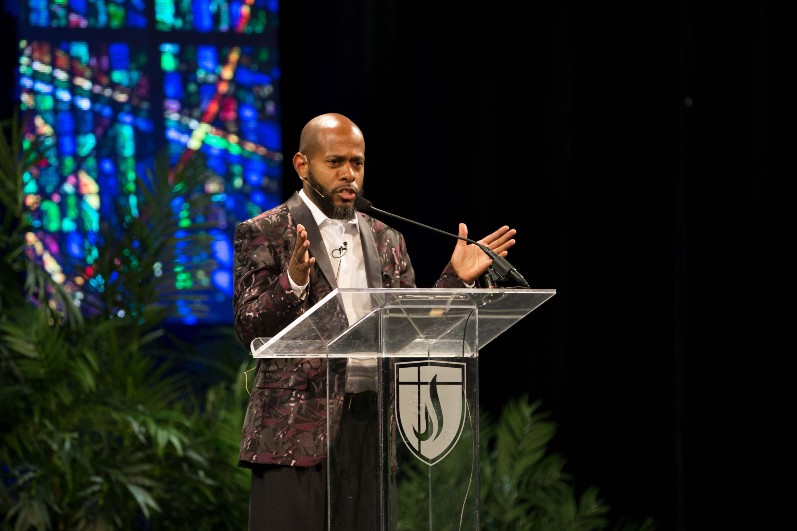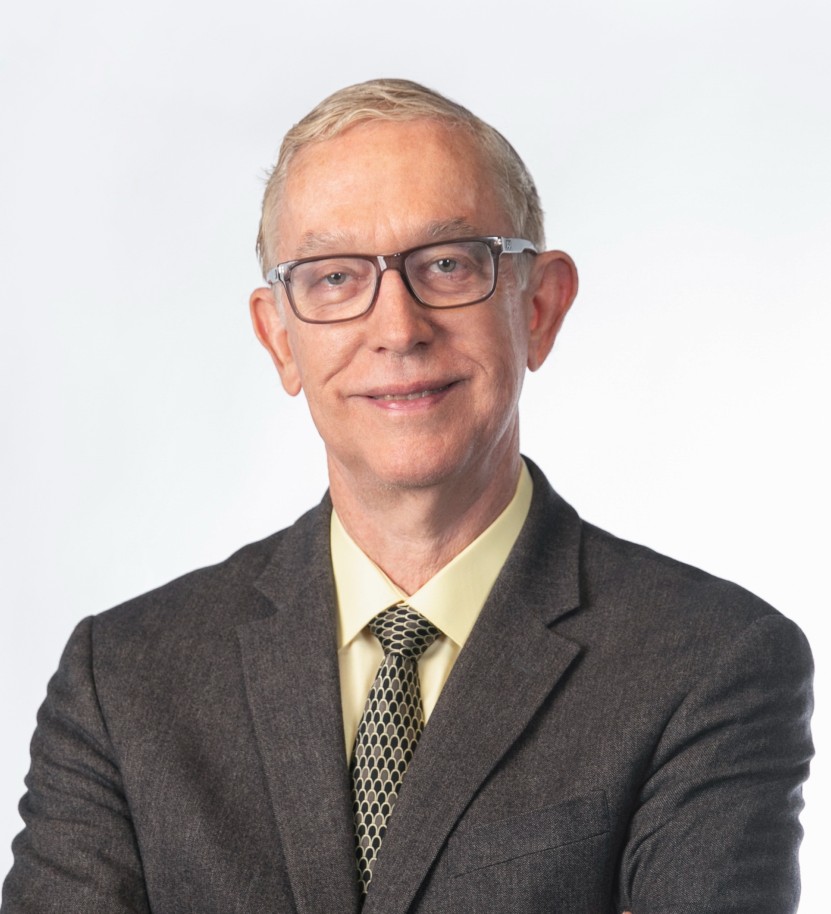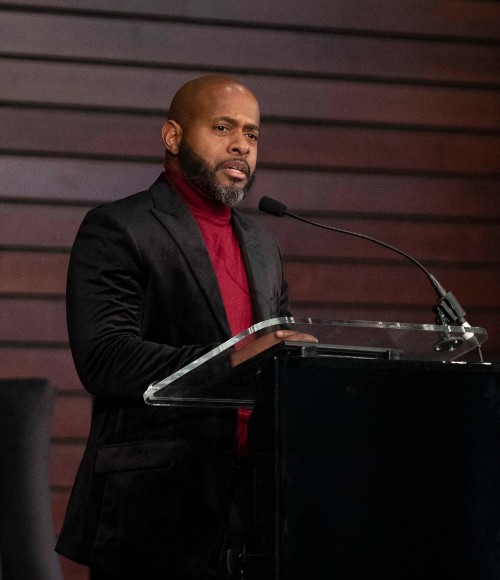Orpheus J. Heyward, senior minister of Georgia's Renaissance Church of Christ, has joined the faculty
Noted expert in biblical exposition, Heyward serves as affiliate professor for expository preaching and Christian leadership in the College of Bible & Ministry.
Keely Hagan | 615-966-6491 |

Orpheus Heyward, Summer Celebration 2019
Orpheus J. Heyward, noted expert in biblical exposition and senior minister of the Renaissance Church of Christ in Fulton, Georgia, has joined the faculty at Lipscomb University as affiliate professor for expository preaching and Christian leadership in the College of Bible & Ministry.
Heyward will teach Christian leadership courses, including the expository preaching course for undergraduates that he has previously taught at Lipscomb and a new preaching course that will be the first of its kind offered at the graduate level through the Hazelip School of Theology. Heyward will also conduct academic events for students and faculty, preachers and church leaders.

Orpheus Heyward
“Joining the Lipscomb faculty is a wonderful opportunity for me because working in higher education has been a long-time dream,” says Heyward. “It’s an honor to pour into those who want to minister well, particularly those who are trying to master the art of expository preaching, which I believe is an important methodology in helping people to grow in the work.
“All preachers should be motivational, but they should also be fundamentally text-centered as opposed to just elucidating an idea or life concept.” He explains, “It’s like deep sea diving and pulling up the jewels that you find in the water. We call that exegesis. Then when you put those jewels on display, showing people what you have, that’s exposition. Then you move to application. I believe the better you put God’s Word on display, the more people will be attracted to what you are preaching, to what the biblical text is saying.”
“He is a very gifted preacher,” says Leonard Allen, dean, College of Bible & Ministry. “He brings skill and passion for preaching and teaching and is considered one of the top preachers of our day.”

Leonard Allen
Under his ministry, Renaissance, originally known as the West End Church of Christ in Atlanta, has become one of the fastest-growing African American Churches of Christ in the nation, and is on pace to become the largest in the brotherhood.
Heyward has been involved with pastoral work for 18 years and continues to guide churches across the country with church growth and development strategies.
“He has many strong connections and relationships with great insight and influence,” says Allen. “In addition to his commitment to teaching, Orpheus will provide us with counsel for growing and promoting our ministry programs and Lipscomb as a whole.”
“He brings a collaborative spirit that will help in our efforts to build bridges, particularly with African American Churches of Christ. There have been troubled relationships there for decades and, although they have improved in recent times, there is still a history there,” says Allen.
“My father-in-law and mentor, Dr. W. F. Washington, was a key proponent of the restoration movement in African American churches and a student of Marshall Keeble, so I am very familiar with the pain he and others have felt regarding the malignant history between Lipscomb and the Nashville Christian Institute,” says Heyward.
“For me, seeing where Lipscomb is today in their commitment to righting its history and the various things they are leaning into to form relationships with African American constituents has touched my heart. I have committed myself to help them start new chapters,” says Heyward. “I feel strongly that the hand of God is in this.”
Heyward says he was introduced to Lipscomb by Scott Sager, vice president of church services, who invited him to speak at Summer Celebration, the university’s faith-based conference that focused on a particular Biblical theme.
“Dr. Sager had availed himself to become knowledgeable about the African American context and my reputation as a preacher,” says Heyward. “From our conversations I was introduced to Dr. Leonard Allen, who I find to be an immense scholar, tremendous thinker and a wonderful visionary. We began to dream about what it could mean for me to be a part of Lipscomb.

Orpheus Heyward
“We all, both Black and white churches, are facing a common crisis,” says Heyward. “We’re living in a culture that’s challenging the notion of the authority of God. The devil has launched a universal attack, so our focus is less about race and more about conviction. Our shared concern is how do we come together to stand flat footed and firm on our convictions regarding the Bible? How do we remain faithful to the authority of Scripture? There is some commonality with those who want to remain fundamentally respectful of the sovereignty of God. I think that it’s actually pulling us together.”
There has been a general decline in people entering into a full-time career in ministry and an increase of those seeking part-time and bi-vocational engagement in ministry. Heyward is exploring additional academic opportunities and ministerial training modules for those who want to learn how to be effective in ministry, whether in a full- or part-time position.
“I have an affinity for trying to help young preachers reach levels of efficiency and effectiveness in the ministry world. I have always wanted to honor that level, and to be able to share with students who wanted to do ministry in a very effective way.”
When asked about his effectiveness and the tremendous growth of his church, he suggests three possible reasons.
- Methodology. “I have always tried to be sensitive to effective methodologies to be relevant to our community and culture. While I have never left trusting the Word of God and being expository in my approach, I believe I am most effective when exposition is relevant to people’s current context. Displaying God’s beauty in this way is more impactful than any program, event or activity you could ever create.
- Message & Ministry. “The essence of marrying together a strong message with strong ministry is powerful. There is a relationship between effective exposition and understanding the necessary principles for strategic growth–that is something I want students to understand. That’s what we see in Acts 6 when they needed to be more effective in the daily distribution of food. We are taught that God’s message cannot be interrupted in order to meet the needs of the ministry. It is not either the message or ministry. It is both. Neglect is often the byproduct of numerical growth. When this happens, leaders must implement effective methods to address the neglect to work in conjunction with the continuation of the preached word.”
- Movement. “I believe in creating evangelistic momentum, not necessarily an evangelism ministry made up of a few select individuals. I invite the entire church to step into the river of evangelism. It has expedited a lot of growth. Also, before the pandemic, I traveled all over the country preaching the gospel and when that was no longer possible, we invested a lot of time and money into effectively streaming our services to provide an experience that was almost as if the person was present. We understood the importance of people from all over having a way to connect, to feel like they were there with us.”
Looking to the future, Heyward says, “I would like to see Lipscomb become the base for ministry training for every ethnic group so that we are culturally relevant and biblically sound. I think it can be a hub that really brings us back to a fundamental commitment to the authority of Scripture and steps into the arena of ethnic relevance that allows us to have a voice that needs to be heard in this world.”
Heyward is enthusiastically engaging with the university, and the Lipscomb community is equally welcoming him. He expresses strong confidence in the new relationship saying, “I think it’s a God move. I love to be sensitive to the hand of God, and I think this is something that is very powerful.”